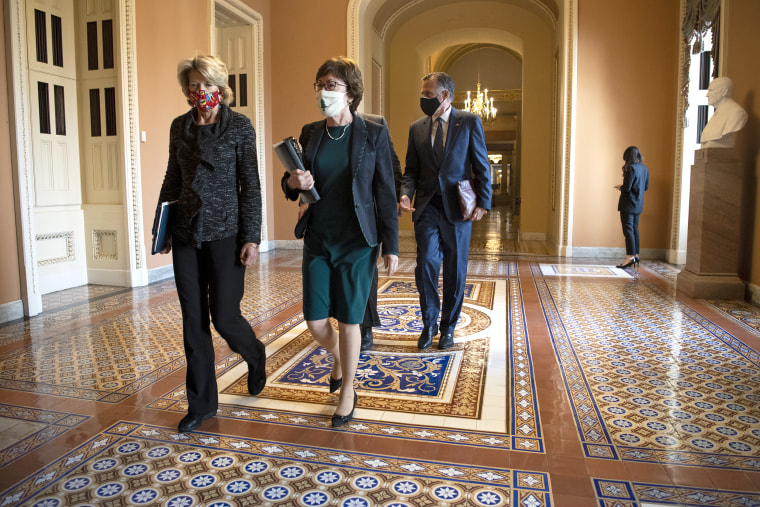A group of 10 Senate Republicans announced over the weekend that they'd crafted an alternative COVID relief package, which they hoped Democrats would accept. It was a difficult pitch to take seriously: the blueprint, touted by one-fifth of the Senate Republican conference, was obviously too meager to be effective.
The ambitious Democratic relief plan would cost about $1.9 trillion. The GOP rival would invest less than a third of that total, slashing key priorities for reasons Republicans haven't explained.
Nevertheless, the 10 GOP senators hoped the White House would take the proposal seriously, and as NBC News reported, they were welcomed into the Oval Office last night.
President Joe Biden held a two-hour meeting Monday with a group of 10 Republican senators who proposed a slimmed-down coronavirus relief plan that they say can win bipartisan support.... Sen. Susan Collins, R-Maine, who is leading the group, called it "a frank and very useful discussion" in brief remarks at the White House.
The Maine Republican told reporters after the discussion, "It was a very good exchange of views. I wouldn't say we came together on a package tonight. No one expected that. But what we did agree to do is follow up and talk further."
This was, incidentally, the first policy discussion President Biden has held with lawmakers since taking office.
Right about now, there are probably plenty of folks learning about this discussion and dreading what might come next. Will Biden curtail his ambitions to make some Republicans happy? Will Democrats feel the need to accept a watered-down compromise, prioritizing bipartisanship over governing? Will communities be forced to suffer to satisfy the whims of a small GOP contingent?
There's no reason to make any such assumptions, at least not yet. White House Press Secretary Jen Psaki issued a written statement last night after Biden's meeting with Collins and her colleagues, which read in part, "While there were areas of agreement, the President also reiterated his view that Congress must respond boldly and urgently, and noted many areas which the Republican senators' proposal does not address. He reiterated that while he is hopeful that the Rescue Plan can pass with bipartisan support, a reconciliation package is a path to achieve that end. The President also made clear that the American Rescue Plan was carefully designed to meet the stakes of this moment, and any changes in it cannot leave the nation short of its pressing needs."
Psaki's statement added that Biden reminded the GOP senators "that he will not slow down work on this urgent crisis response, and will not settle for a package that fails to meet the moment."
This does not sound like a White House ready to scale back its plans just to make Republicans feel better.
Indeed, congressional Democratic leaders continued to move forward yesterday with plans to pass their own bill through the budget reconciliation process -- which would prevent Republicans from killing the legislation with a Senate filibuster.
So why would the president agree to last night's meeting in the first place? I think it reflects what Biden means when he talks about a renewed approach to political "unity."
In this instance, the president didn't need to talk to these senators, but he did it anyway because he sees value in having a respectful conversation with lawmakers from a rival party. Biden heard them out, and he asked them to hear him out. He made his case, in the hopes that they might be persuaded, and the president listened to their case, expressing an openness to new ideas.
There were no tantrums. No one felt the need to storm out of the room. The discussion prompted no presidential tweets in which he questioned lawmakers' patriotism or tried to bully them into submission. A group of grown-ups simply spoke about a pressing national issue.
There's plenty of room for skepticism about whether last night's Oval Office meeting will amount to anything meaningful. Chances are, Democrats will invite Republicans to support an ambitious relief package; GOP lawmakers will balk; and Democrats will pass it anyway.
But given the politics of the last few years, Biden's meeting was itself a return to a more mature approach to politics.
Postscript: There was some coverage yesterday suggesting the bill from Collins and her colleagues is the "bipartisan" approach. For the record, this is a poor description. Ten Senate Republicans wrote a blueprint on their own, with no Democratic input. Most of their own GOP cohorts don't support their plan.
There's nothing "bipartisan" about it.

